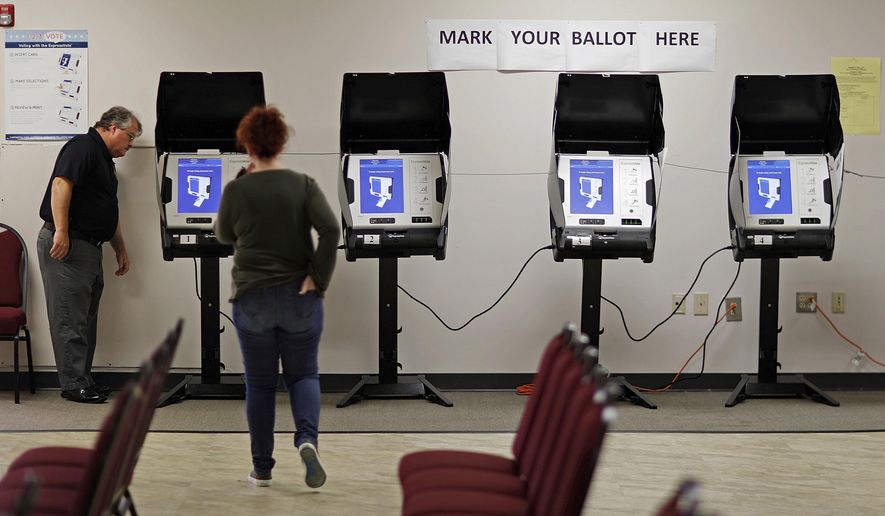Senators supportive of the Secure Elections Act, a bipartisan bill to protect political contests from cyberattacks, said lessons learned from next month’s midterms could make their way into a revised version in the works.
Sen. Roy Blunt, Missouri Republican, and Sen. Amy Klobuchar, Minnesota Democrat, addressed efforts to rekindle the stalled Secure Elections Act during an event held Wednesday by the U.S. Election Assistance Commission in Washington, D.C.
The bill will not be passed prior to the Nov. 6 midterms, according to both Mr. Blunt and Ms. Klobuchar’s co-sponsor, Sen. James Lankford, Oklahoma Republican, meaning states are missing out on millions of dollars that would have otherwise been allocated toward upgrading and securing voting and election systems, neglecting a major vulnerability raised by Russian hackers meddling in the 2016 race.
“We are not going to get anything in law between now and Election Day, which probably makes it even more important that we immediately look back at this election and say, ’Okay, what happened that should have happened? What happened that shouldn’t have happened? What kind of deference was given to people who have been elected to do these jobs, what kind of security and clearance and immediate access to information was given to people who do these jobs, and I can guarantee you that I will be very committed to doing that,” said Mr. Blunt.
“Obviously 2018 is going to inform us as we go into the 2020 election,” Ms. Klobuchar said later during the event.
Introduced in the wake of the 2016 race, the Secure Election Act would “streamline cybersecurity information-sharing between federal intelligence entities and state election agencies, provide security clearances to state election officials and require adequate post-election auditing procedures so each election can be double-checked and verified,” according to Mr. Lankford’s office.
The bill had garnered bipartisan support prior to stalling in August when Jim Condos, the president of the National Association of Secretaries of State, opposed the bill as “problematic,” taking particular aim at the post-election audits requiring paper ballots as an “unfunded mandate” and subsequently losing the backing of some Republicans, Mr. Blunt said previously.
“We have a new version coming out,” Ms. Klobuchar said Wednesday. “I would love to have it get passed in the lame duck. For people that want to delay it or stall it beyond that, well, that’s up to you, because then we’ll have a new Congress.”
“We want to give you more money, states, to help you. But we want to also make sure that we take those best practices that we know are working, which is these backup paper ballots that we know will protect us if there’s a hack,” said Ms. Klobuchar.
Russian hackers probed election systems in at least 21 states during the 2016 race in tandem with a state-sponsored interference campaign conducted against the election and presidential candidate Hillary Clinton in particular, according to U.S. officials.
In addition to hacking targets including the Democratic National Committee and the chairman of Mrs. Clinton’s campaign, John Podesta, among others, Russian hackers also stole voter rolls in at least one state and compromised an American company that manufactures voter registration software.
“The central thread of the fabric of Democracy is people having confidence that what they were told happened on Election Day is what absolutely happened,” Mr. Blunt said Wednesday. “Sometimes it’s hard enough to accept the results of an election, even if you fully are convinced that that’s really what voters wanted to do. It’s certainly hard to accept the results of an election if somehow you think there’s any question about that.”
“We really hope we can work this out,” said Ms. Klobuchar.
• Andrew Blake can be reached at ablake@washingtontimes.com.




Please read our comment policy before commenting.